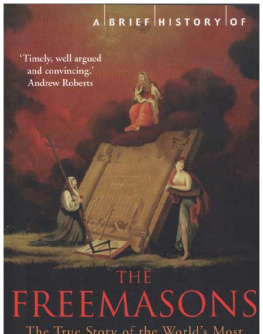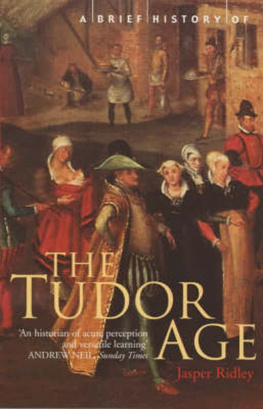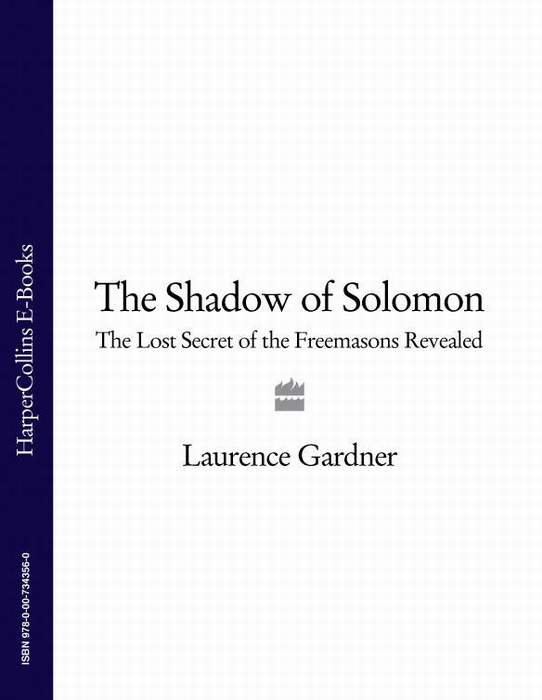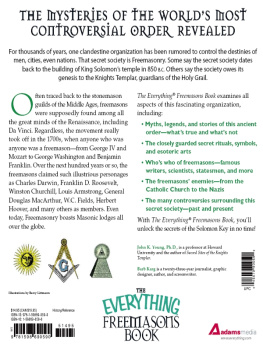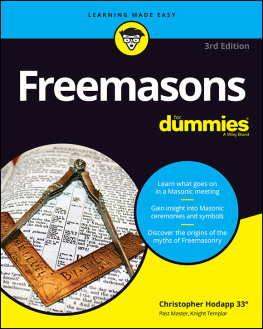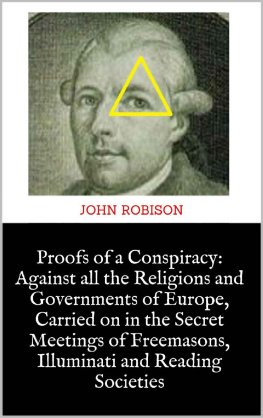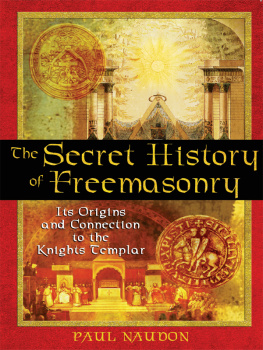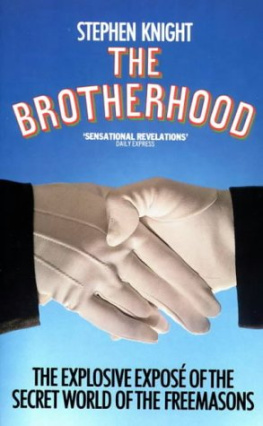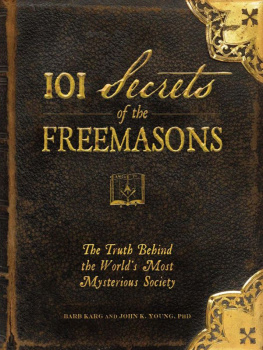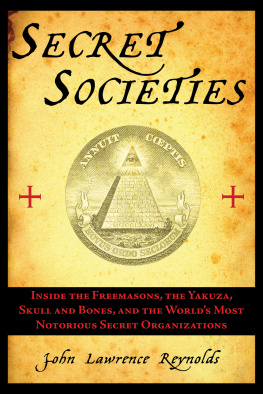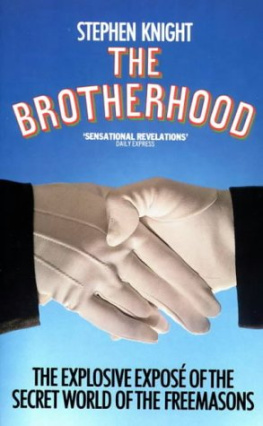Jasper Ridley is a highly acclaimed historian. He is the author of a number of titles including A Brief History of the Tudor Age, He died in 2004.
Constable & Robinson Ltd 3 The Lanchesters 162 Fulham Palace Road London W6 9ER www.constablerobinson.com
First published by Constable, an imprint of Constable & Robinson Ltd, 1999
This edition published by Robinson, an imprint of Constable & Robinson Ltd, 2008
Copyright Jasper Ridley 1999, 2008
The right of Jasper Ridley to be identified as the author of this work has been asserted by him in accordance with the Copyright, Designs and Patents Act 1988
All rights reserved. This book is sold subject to the condition that it shall not, by way of trade or otherwise, be lent, re-sold, hired out or otherwise circulated in any form of binding or cover other than that in which it is published and without a similar condition including this condition being imposed on the subsequent purchaser.
A copy of the British Library Cataloguing in Publication data is available from the British Library
ISBN: 978-1-84529-678-0
Printed and bound in the EU
To my grandchildren Owen, Abigail and Anna
CONTENTS
Acknowledgements
I wish to express my gratitude to everyone who has helped me while I was writing this book.
Her Majesty the Queen graciously permitted me to quote from a letter of Queen Victoria in the Royal Archives at Windsor.
I must thank first and foremost the Librarian and staff of the Library and Museum of Freemasonry at Freemasons Hall in London. Although I am not a Freemason they allowed me to work in their library on sixty-three days, and gave me the benefit of their expert knowledge and efficient assistance, without, of course, making any effort to influence the opinions about Freemasonry which I would express in my book. I thank them, and all my Freemason friends, for the encouragement which they have given me, as a non-mason, to write an objective book on the subject.
I thank Hugh Barnes-Yallowley, Dr Charles W. Hollenbach and James Young for reading and advising me on the typescript; Lieselotte Clark, Marlies Evans, Antonia Fraser, Anita Garibaldi, John Hamill, Emina Kurtagic, Branko Markic, Ljubica Simic, Dr Michael Smith and Signor Salvatore Spinello for their help with the research and for the information which they gave me; Sarah Christensen, Wendy Hawke, Commander Michael Higham (the former Grand Secretary of the United Grand Lodge of England), Charles Hodgson, Duska Jovanovic, Branka Kolic, Ruth OBrien, Robert Pynsent, Ingrid Price-Gschlossl, my daughter Barbara Ridley, Denise Sells, Jasna Srdar, Derek Stuckey, George H. Vincent, S. F. N. Waley, Anthony West (a member of the Board of General Purposes of the United Grand Lodge of England) and Sharon Willett of Press Ahead for their help in various ways; the Librarian and staff of Canning House; the Inner Temple; the Istituto Italiano di Cultura in London, the Kent County Library at Tunbridge Wells (whose recent decision to remain open on Saturdays and Sundays has made it possible for me to finish this book on time); the London Library; and the Libraries of the University of California at San Diego and Berkeley, California; my publisher Benjamin Glaze brook and the staff at Constable and my agents Curtis Brown of London; the staff of the Carpenters Company of London; my wife Vera for reading and advising me on the typescript and for her help in compiling the bibliography; and her and my son John and Henry Hely-Hutchinson for correcting the proofs; and Mrs Helen Baz for compiling the index.
The Master, Fellows and Scholars of Churchill College in the University of Cambridge kindly permitted me to use information in the Churchill Archives in the College.
The Secretary of the Ars Quatuor Coronatorum Lodge kindly allowed me to quote several passages from their AQC publications and from Knoop and Joness The Genesis of Freemasonry and Early Masonic Pamphlets .
I have been kindly allowed to quote a passage from Wellington at War edited by the late A. Brett-James.
Jasper Ridley
Tunbridge Wells,
13 August 1999.
Introduction
In Britain in 1999 the Freemasons are once more under attack. The accusation levelled against them is that they are a secret society of men who take the most solemn oaths, enforceable by horrible penalties, to further their own interests against those of the cowans (non-masons); who recognize each other by secret signs; and who then extend favours to each other even though this conflicts with their public duties. It is therefore improper that Freemasons should be in positions of authority, particularly in the police force or the judiciary. Police officers will help masonic criminals to escape. When judges are sitting in court, the prisoner in the dock, or a witness in the witness-box, will make a secret sign to the judge, who, recognizing him to be a mason, will give judgement in his favour, because the masonic oath overrules his public duty as a judge.
The masons, on the other hand, deny that they are bound by oaths to help their masonic brothers at all costs. They say that the oath to help a brother is subject to the overriding duty to obey the law, and that a brother must never be helped to break the law.
Which of these arguments is correct? If we examine the history of the Freemasons in the last 300 years, it is quite clear that the Freemasons are right, and that fears that they constitute a society whose members help each other to break the law, are unfounded. During 250 years of wars, revolutions and political upheavals, masonic oaths and obligations to help their masonic brothers, except in a very few cases where special circumstances existed, have counted for nothing when they have come into conflict with national allegiance, class interest, ideological zeal, or the personal ambition of the mason.
The anti-masons and their supporters in the media demand that Freemasons should be compelled to disclose the names of their members. If it had not been for the reforming enthusiasm of earlier MPs, this would have been unnecessary; for by the Unlawful Societies Act of 1799 Freemasons were required to give their names to JPs. They duly complied with this requirement until it was abolished in 1967 by the Criminal Law Act at a time when a large number of obsolete Acts of Parliament were repealed by the Statute Law Revision Acts. As the Unlawful Societies Act 1799 was designed primarily to suppress Radical organizations and trade unions, the MPs abolished it without pausing to reflect on what the consequences might be. Now they wish to re-enact some of its provisions. The Freemasons do not really object to thisthey were happy enough to comply with the Act until 1967but they do object to being singled out as different from a golf club or any other similar association.
The fear of the anti-masons that a Freemason police officer or judge cannot be trusted to do his duty because of his masonic oath, is based on an extraordinary naivete of which both masons and anti-masons are often guilty. Both sides agree that there are good masons who carry out commendable charitable work, but that there are also bad eggs in the masonic basket, and that it is with the activities of the bad Freemasons that they are concerned. A man who is prepared to put on fancy dress and swear an oath which he realizes is weird, horrific and antiquated, because he thinks that it will help his career to do so, will not perform this oath if he thinks that if he does so, and is caught and found out, it will harm his career. This has been shown repeatedly in the history of Freemasony in Britain, France, the United States and every country in the world.

